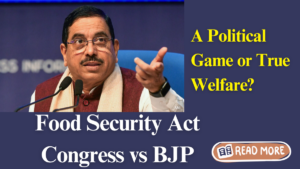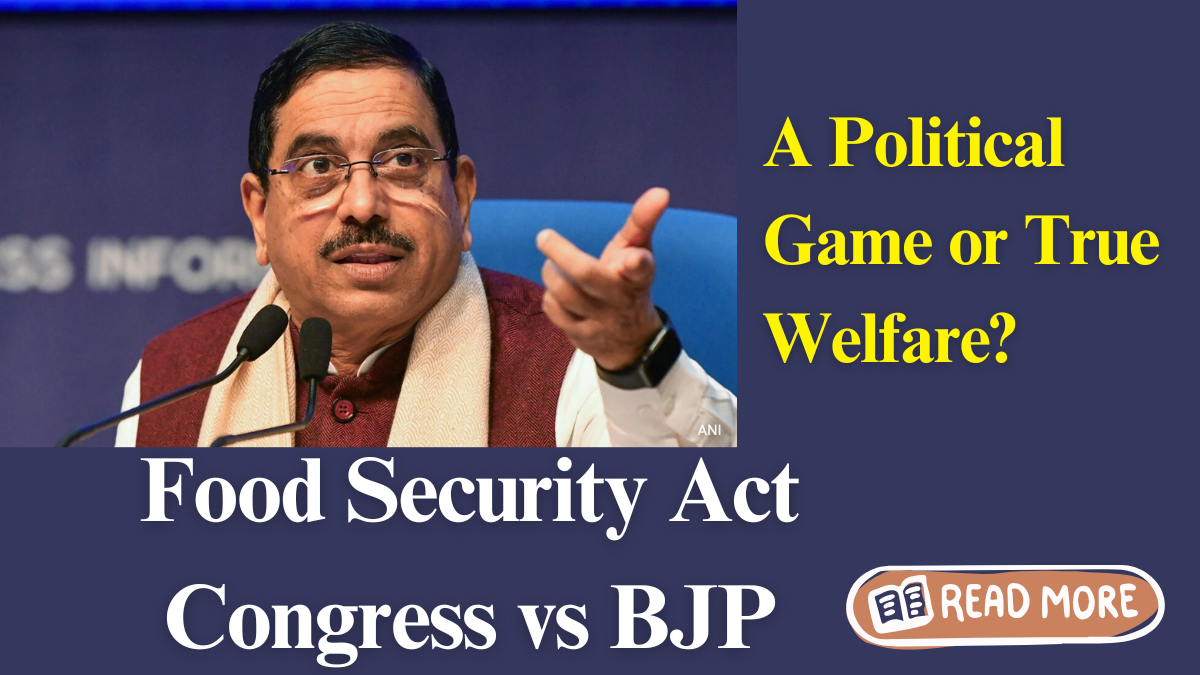
What is the National Food Security Act (NFSA)?
Congress Claims: Sonia Gandhi’s Contribution
In the Lok Sabha, Congress MP Praniti Shinde acknowledged that the Food Security Act was initiated by Sonia Gandhi, then the President of the Congress party. She explained that the Act was a political move by the Congress-led UPA government to benefit the poor and help them access essential food items at subsidized prices. The Congress believed the move would be a significant political advantage as the law directly benefited millions of Indians, especially ahead of elections.
Pralhad Joshi’s Response: Modi’s Role in Improving the System
Pralhad Joshi, the Union Minister for Food and Public Distribution, responded to Shinde’s comments by acknowledging the importance of the Act but emphasizing the role of the Modi government in systematizing and enhancing its implementation. Joshi made it clear that although the National Food Security Act was brought in by the previous government, the current government under Prime Minister Modi had worked hard to ensure its proper execution.
Joshi pointed out that the BJP government had improved the efficiency of the Public Distribution System (PDS), ensuring that food grains reached the intended recipients without delays or corruption. Additionally, under the current government, digitalization and direct benefit transfers have been integrated into the system to reduce leakage and ensure a fairer distribution of resources.
Key Reforms by the Modi Government
-
Improved Distribution System: The government has made sure that food grains reach the needy through a more transparent and efficient system.
-
Digital PDS: With the digitalization of the Public Distribution System (PDS), the process has become more efficient, reducing pilferage and ensuring that food grains are distributed fairly.
-
Direct Benefit Transfer (DBT): The government introduced DBT, which helps in transferring food subsidies directly to the bank accounts of the eligible families, reducing the chances of corruption.
-
Expansion of Coverage: The Modi government has also expanded the coverage of the food security scheme, ensuring more people are included under the NFSA.
-
PMGKAY: The Pradhan Mantri Garib Kalyan Anna Yojana (PMGKAY) scheme was introduced during the COVID-19 pandemic to provide free food grains to the poor during the crisis, ensuring that no one went hungry.
The Debate: Who Should Get Credit?
The Congress party has often credited itself with the introduction of the Food Security Act and argued that it was a bold move by Sonia Gandhi to help the poor. They claim that the Act was an important election-driven initiative. However, the BJP government under Prime Minister Modi focuses on how it has refined and streamlined the implementation of the Act, arguing that it is not just about passing a law but about making sure it works effectively on the ground.
Both parties have used the Food Security Act as a tool for political rhetoric, but the focus remains on its success in tackling hunger and improving the living standards of the poor. Whether or not the Act was election-driven, its impact has been significant in providing food security to millions of vulnerable families.
Conclusion: A Key Welfare Initiative
The National Food Security Act is undoubtedly one of the most important social welfare laws in India. While its introduction happened during the UPA government, the Modi government has made it more effective by improving the system’s efficiency, coverage, and transparency. The key takeaway is that regardless of political narratives, the NFSA has played a significant role in helping the poor and marginalized communities in India by giving them access to affordable food.
FAQs
1. What is the National Food Security Act (NFSA)?
The NFSA is a law passed in 2013 to provide subsidized food grains to poor households in India, ensuring food security for millions of people.
2. Who is credited with introducing the National Food Security Act?
While Congress MP Praniti Shinde credits Sonia Gandhi for introducing the Act, Pralhad Joshi of the BJP points out that it was the Modi government that made it more effective and efficient.
3. What improvements did the Modi government make to the Food Security Act?
The Modi government introduced digital PDS, direct benefit transfers (DBT), and increased the coverage of the scheme to ensure that more people benefit from it.
4. How did the Modi government ensure that food grains reached the needy?
The government made the PDS system more transparent, reduced corruption, and used digital platforms to streamline the distribution of food grains.
5. Was the Food Security Act introduced for political reasons?
While the Congress used the Act as an election tool, both governments, regardless of political differences, have focused on its role in providing food security to millions of people.
Click here to learn more.
Pari is a passionate writer known for captivating stories that blend imagination and reality. Inspired by travel, history, and everyday moments, Pari crafts narratives that resonate deeply with readers.
